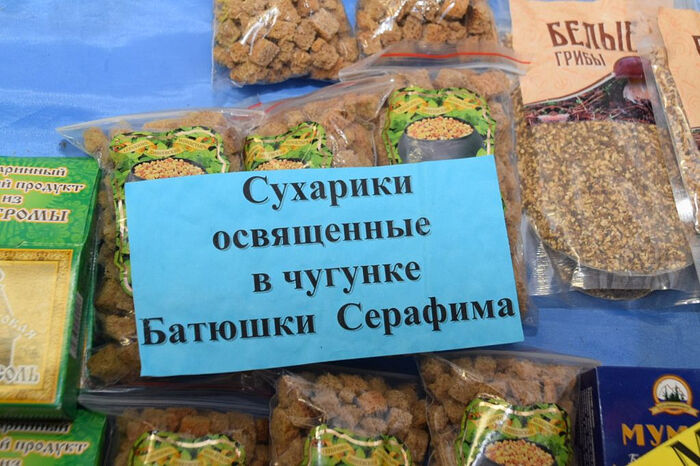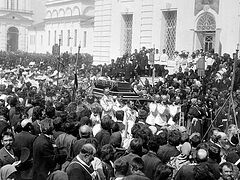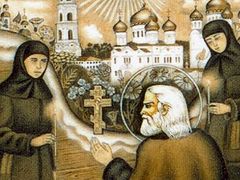I was setting out for Diveyevo, to St. Seraphim. After reading extraordinary stories about miraculous appearances of Seraphimushka [an affectionate form of the name Seraphim.—Trans.] to people who were looking for him, I tried to imagine that I, too, might be granted such mercy. In the morning our train arrived in Arzamas and, having transferred over from the train to a bus, I continued to imagine whether I would be able to walk to Diveyevo, just as in olden times in Russia people used to go on walking pilgrimages, hoping for the fulfilment of their prayer requests. But as time went by, the bus kept going and going. How many miles and days would I have to tramp? “Cars are driving along the highway in an endless stream—you can’t walk a couple of miles here,” I thought and calmed down. In truth, great ascetic feats are not for us.
Soon we turned towards the convent, and the first thing I noticed was the total absence of forest. But they say that batiushka would come out of the bushes, for example, to tell to a lost old woman the way. The convent stood in the middle of an empty plain, apart from a cluster of buildings. Of course, the first thing I did was go into the church, to his shrine, with the words: “Batiushka, here I am at last!” After venerating the icons, I went to find a lodging for the night.
I was planning to visit Sanaxar Monastery1 after Diveyevo, and in my bag I had people’s letters to Elder Ieronim.2 And I longed to stay with the Venerable Seraphimushka for at least three days. Famous local springs attracted me as well. But, as is generally known, if you want to make God laugh, tell Him about your plans. All of a sudden, I felt such terrible despondency and heaviness on my heart such as never before. I suddenly wanted to leave everything at once and rush back home. Confused, I called my husband, and once I heard his voice, I burst out crying. He sensed intuitively what state I was in.
“What’s up with you?” he shouted.
And I replied:
“If I were given an airplane, I’d rush away from here without looking back.”
“So, go back.”
“I can’t, because I’ve got letters for Father Ieronim.”
Then my mother came up to the phone, and I learned that my husband was suffering from pangs in his kidneys—kidney stones! I returned to the convent and hurried to the large icon of St. Seraphim, which is on the left at the entrance, with questions, or rather, complaints:
“Batiushka, what is it? What is my husband so suffering for?”
“He should suffer—it’s the fast now,” I heard the answer.
“What’s going on with me? I’d been dreaming so much of coming to you, but my soul has been plunged into unbearable anguish. Where is the joy of meeting you? Others cry with joy, bowing to you, but I’m almost howling!”
“It’s the way it should be. Be patient,” I heard another answer.
I don’t know why it occurred to me to go to Sanaxar Monastery right away, but with pleading eyes I was running around the area where there were tour buses with signs: “From Moscow”, “From St. Petersburg” etc., with the same question: “Are you going to Sanaxar Monastery?” But all the answers were negative. Everyone had already returned from there. But I heard by chance that every day a local took passengers to Sanaxar for the same sum that a bus trip cost. I clung to that idea and started looking for him. The courtyard in the convent was small, so I rushed around it, hoping to stumble upon the number nine car. More than an hour later I came across a local nun and wondered if she had seen the number nine car. And then I heard the unimaginable:
“It’s just left with one vacant seat. The driver looked for a very long time so that there would be no empty seats. He doesn’t like it and usually looks until the last moment.”
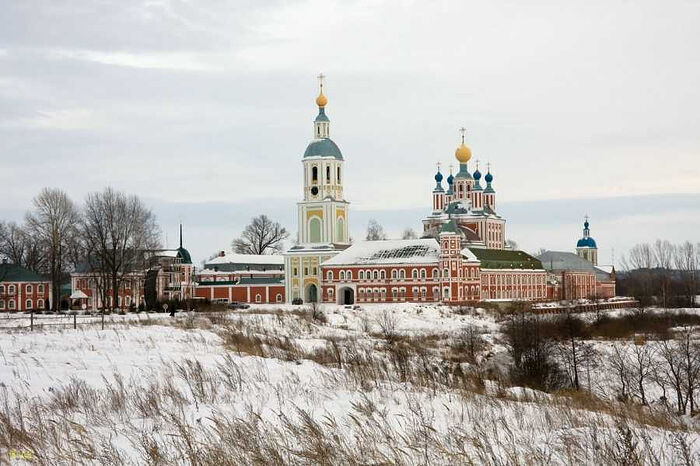 Sanaxar Monastery. Source: keeptravel.com
Sanaxar Monastery. Source: keeptravel.com
I thought the ground would open up under me. It was simply impossible! It doesn’t happen like that! It was unreal. We couldn’t miss each other even if we were looking for each other blindfolded. And it’s one thing to miss a person, and another to miss a car!
Completely worn-out, I trudged back to my room. I didn’t have the strength to pray, walk, or look at the local sights. How could I explain to myself the increased despondency? The thought that Father Seraphim himself was displeased with me haunted me. Who else could be kicking me out like that? He’s the master there. I came to him, my soul longed for him, but instead of joy I felt sadness and heart-rending depression. It meant that he did not accept me because of my grave sins. He hadn’t even helped me with the car and hadn’t let me take the bus. “I probably must go home and leave the convent,” I thought. But how about the letters for Elder Ieronim? I was ready to pass them on to the elder through unknown people if only for prayers. Immersed in gloomy thoughts, I entered my room and did not notice how my roommate came in after me. In response to her questions, I told her reluctantly about my “ordeal” in the convent courtyard, and then I heard her surprise:
“Why are you frustrated? St. Seraphim himself is not letting you go away from him!”
“Me?! Seraphim himself?! Do you really think so?”
“Surely. I saw this car and its owner. He waited a long time in the same place in search of one more passenger! It’s hard to believe that you haven’t met, judging by your story.”
What I experienced at that moment is difficult to explain. But I felt great relief that batiushka was not driving me away. If not Seraphimushka, as he is affectionately called in the convent and all over Russia, then who? Then despondency gave way to quiet joy and amazement. I had had temptations in all monasteries I visited, but then I experienced such despondency for the first time in my life. Exhausting melancholy almost on a physical level pressed down with all its weight on my soul. And there seemed to be no way out.
I read somewhere that batiushka himself advised the Diveyevo sisters to put a small piece of dried bread under their pillows to fight despondency: “Once melancholy attacks you, take it from under the pillow, eat it, and that will be your consolation.” Due to my passion of gluttony, while reading I imagined a huge piece of dried bread under my pillow, whether with poppy seeds or raisins—I would not have refused either. But even with the most vivid imaginings I wasn’t sure if it would console me.
Now, many years later, as I recall it I smile at my ignorance. It had never crossed my mind that batiushka meant a tiny piece of dried bread, baked with prayer and, most importantly, blessed by him! It was his blessing that comforted the suffering souls of Diveyevo sisters!
I had the opportunity to see how dried crusts are cut and even participated in it. Obedience was carried out by several women at once, supervised by a nun. And as soon as any of us stopped praying, a spontaneous conflict occurred (no matter for what reason). The nun would turn around and give the command: “Let’s sing, ‘O Theotokos and Virgin, rejoice Mary full of grace.’“ Everyone would start singing and work would resume instantly.
On the porch of the cathedral I met a visiting nun. She, a frail woman, had driven to Diveyevo in order to get to Sanaxar Monastery from there to see Elder Ieronim and seek advice. Her convent was situated in the town of Pokrov, and some discord in it had almost broken her faith. I brought the dejected nun to our room where one bed was still vacant. Promising to accompany her, I went to the bus station to inquire about the way to Sanaxar. I decided not to run around looking for a bus or a car, but I was unable to memorize all the listed stops in the Mordovian language, which sounded so strange and unfamiliar to me. And I went to the venerable father himself.
I stood in front of the same large icon at the entrance and began to complain again: “Batiushka, you didn’t let me go when I wanted to leave. You didn’t give me the bus, then you didn’t show me the car, and I can’t memorize the names of the stops on the way to Sanaxar where we make transfers. What am I supposed to do now? So drive me there as you like.”
Everybody will wonder: Why such undue familiarity, if not cheek? But my requests were simple, artless, and childishly demanding. After all, we needed to go to Sanaxar somehow, but how? Who could help us better than the master of these parts? And, confident in the validity of my demands and that they would be “satisfied”, I walked back to my room to sleep with a sense of accomplishment.
The next morning we got up early and went to the bus station to go on the first bus. The nun did not speak much, but her despondency was so strong that, remembering my recent temptation, I tried my best to support her. Soon my role in this was successfully taken over by someone else. While buying a ticket, I caught a brief glimpse of a homeless man sleeping on a bench. Once we told the ticket office cashier out loud where we were going, the man jumped up, as if he hadn’t been asleep, and started asking eagerly to go with us, saying he knew the way, would show us all we needed to see, and accompany us. We were surprised, but agreed reluctantly and embarked on our journey. There were transfers, waits, and hours on the road, but all the time our companion was talking about something and imperceptibly supported the nun (her name was Galina) throughout the journey. He confessed that he used to work in the Diveyevo Sketes and talked a lot about them—how good it was there, how calmly and serenely the sisters’ obediences were performed, and how beautiful it was there. But we didn’t say a word about how hard it was for our nun and why. He did everything as if by accident and smiled all the time. He explained to me, a chocoholic, that there is dairy-free chocolate which is good for the fasting period, adding that Elder Ieronim loved chocolate. I rushed to the nearest shop without thinking how our companion knew about chocolate and my passion for it. He told us that the day before he was near Fr. Ieronim’s cell, but did not get there and walked to Diveyevo at night to go back again in the morning. Why? We didn’t think about it then, we just listened to him without asking questions. How could he cover such a distance at night from Sanaxar to Diveyevo in order to be at the bus station in the morning? And why such a rush, if he could safely have put up at the pilgrims’ hostel for the night? And another question arose later: Where did he go? Because on reaching the destination we saw him only for the first five minutes. We never saw him again—neither at the refectory, nor at the prayer service at Fr. Ieronim’s, nor in the courtyard, nor at the church, nor by Fr. Ieronim’s cell.
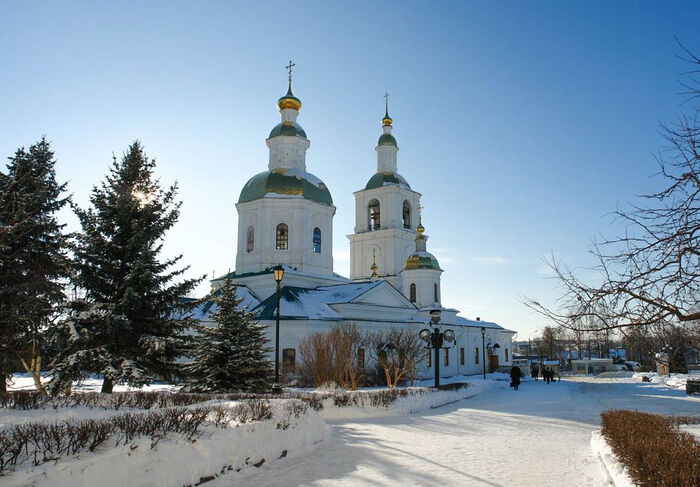 Holy Trinity Diveyevo Convent of St. Seraphim. Source: Diveyevo-monastyr.ru
Holy Trinity Diveyevo Convent of St. Seraphim. Source: Diveyevo-monastyr.ru
Later I mused on who our companion was and why he disappeared once he brought us to the destination. We sat in silence for a long time, digesting the mercy of St. Seraphim. That was the end of my “adventures” in Diveyevo.
Yes, Father Seraphim... How many books I read about you, about Nikolai Motovilov and his trials, and about acquiring the grace of the Holy Spirit through the Jesus Prayer. To this day you remind me to resort to it in all circumstances. As I look at your icon in our parish—and it’s right at the place of confession—I have only one thought: “Don’t forget the Jesus Prayer.” And you give the same answer to all my questions and petitions: “Pray.” Only once, with severe temptations and fear for others, I cried out to you on your August feast for help, and you replied: “The best way to deal with trouble is to put it in God’s hands.” And silence and peace began to reign in my heart instantly. Indeed, how often in agitation and temptation it is hard for us to remember the most important thing—about trusting God.
“If a Christian who strives to fulfill the commandments of Christ as best he can, always protects himself with faith and hope by the Jesus Prayer and the sign of the cross, he not only fearlessly and safely gets through disastrous and dangerous situations in this life, but also the tollhouses after death” (the Optina Flower Garden).


